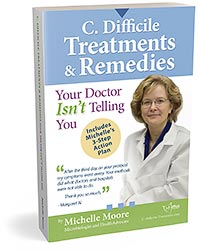 Doctors rarely deviate from standard protocol treatments and most have no training or experience with antibiotic alternatives for C. difficile. Antibiotic drugs are both the number one cause and the number one treatment for C. diff. infections. This contradiction can be both confusing and frustrating.
Doctors rarely deviate from standard protocol treatments and most have no training or experience with antibiotic alternatives for C. difficile. Antibiotic drugs are both the number one cause and the number one treatment for C. diff. infections. This contradiction can be both confusing and frustrating.
Taking antibiotics for a UTI, dental procedure, sinus infection or some other type of infection is the number one cause of C. difficile infections. And if you get a C. diff. infection, antibiotics such as Vancomycin are the standard treatment that your doctor will prescribe.
Around 70% of C. diff. infections resolve themselves using antibiotics. However, for the other 30%, the infection can return within days or weeks after finishing the antibiotics. For those 30%, a fecal transplant is the only other option offered by mainstream medicine and other treatment options have not been found1.
The root cause of a C. diff. infection is an imbalance or disruption in your intestinal flora, or microbiome. And a common and powerful way to disrupt your gut flora is to take antibiotic drugs. Antibiotics kill many of your good and “friendly” gut bacteria, leaving room for C. diff. to overgrow and cause trouble.
High Risk Antibiotics
There are many different kinds of antibiotics and some are more likely to cause C. diff. than others. Below is a list of specific antibiotics and classes of antibiotics most likely to cause C. difficile infections:
- Fluoroquinolones. This commonly-prescribed class of antibiotics includes ciprofloxacin (Cipro), levofloxacin (Levaquin), moxifloxacin (Avelox) and gatifloxacin (Tequin) to name a few. This class of antibiotics is known for its numerous negative side effects.
- Clindamycin. This commonly prescribed drug often causes C. difficile infections.
- Cephalosporins. This class of drugs includes the antibiotics cephalexin (Keflex), cefuroxime (Ceftin) and cefaclor (Keflor).
- Amoxicillin. Also called Agmentin and Clavamox, these drugs and other B-lactam antibiotics can cause C. diff. infections.
According to the Centers for Disease Control and Prevention (CDC), C. difficile infection is the biggest superbug threat in the United States2. So you should consider very carefully if you really need to take antibiotic drugs. And if you do take them, it’s important to avoid those drugs which are more likely to cause C. difficile, especially if you have a prior history of having C. difficile.
Effective Alternatives to Antibiotics

Therapeutic quality herbal antimicrobials attack an infection on multiple fronts by combining ingredients with antibacterial, immune support, tissue healing and toxin-binding properties.
There are natural, herbal antimicrobials that kill bad gut bacteria and our favorites we recommend are from Biocidin Botanicals. We’ve seen first-hand from hundreds of people using them, that they are gentle, effective and don’t carry all the negative side effects of antibiotics.
These herbal antimicrobials target disease-causing gut pathogens and break open the protective gut biofilms these microbes hide within. Plus they don’t promote recurring infections like antibiotic drugs.
Many holistic doctors use natural antimicrobials in the place of, or alongside antibiotic drugs. And the good news is, our favorite powerful line of antimicrobial herbal products has been used successfully for decades among thousands of doctors in the US.
If you’d like to take the next step toward recovery, see Michelle’s recommended broad-acting antibiotic alternatives and toxin binder for gut infections at her EmbraceHealthNaturals.com remedy store.
It’s important to realize that your mainstream medical doctor is unlikely to know about or support your use of antibiotic alternatives. These alternatives are available without prescription and can be used safely and effectively as home remedies.
If you have C. difficile, you should be under the care of a knowledgeable healthcare professional to answer your medical questions and to monitor your progress. Seeing a holistic or natural doctor is the best way to get professional medical support and guidance for using antibiotic alternatives.

About the Author – Michelle Moore, BSc
Michelle Moore is a microbiologist, holistic health educator, and author of C. difficile Treatments & Remedies. With over 10 years of experience in pharmaceutical research and over 20 years in natural medicine, she helps people overcome C. difficile and other chronic infections naturally.
References
- Johns Hopkins Medicine, Fecal Transplantation (Bacteriotherapy), https://www.hopkinsmedicine.org/health/treatment-tests-and-therapies/fecal-transplant
- Antibiotic Resistance Threats in the United States, 2019; CDC report.
https://www.cdc.gov/antimicrobial-resistance/data-research/threats/index.html


 Fill in the form below to get our C. diff. tips newsletter and your free report “10 Things You Need to Know to Overcome C. difficile”.
We value your Privacy. Your email will be kept strictly confidential & secured. See our
Fill in the form below to get our C. diff. tips newsletter and your free report “10 Things You Need to Know to Overcome C. difficile”.
We value your Privacy. Your email will be kept strictly confidential & secured. See our 
